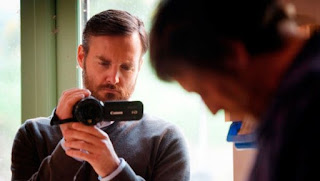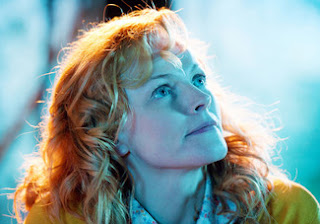Doing Somersaults for Run & Jump
6/3/13
I was quite taken with The Rocket, which won the Audience Award (as well as being voted the Best Narrative Feature) at the recent TriBeCa Film Festival, but I was rooting for the splendid Run & Jump. American Steph Green's witty, perceptive German-Irish co-production is about the Caseys, a happy family living in Ireland's Kerry County, which tries to put itself together after a stroke leaves the 38-year-old father, Conor (Edward MacLiam), physically fit but brain-damaged. They get needed financial help when a stick-in-the-mud American doctor, Ted Fielding (SNL alum Will Forte in his first dramatic role), pays to stay in their house for two months and study and film Conor. At first he doesn't connect with Conor's optimistic but struggling wife, Vanetia (a marvelous Maxine Peake), or their closeted-gay teenage son Lenny (Brandan Morris) and always cheerful young daughter Noni (Ciara Gallagher), but over time he loosens up and becomes close to them all, often taking on the father role and sometimes the mother role, too. The escalating romantic feelings between Vanetia and Ted results in a lot of soul-searching. "This is not a story about a man adjusting to life after a stroke," says Green in the film's press notes. "This is a story about a woman adjusting to a new man. This side of the story isn't often told...[Alibhe Keogan's] script navigated a classic love triangle trip in a new way, in a distinctive world, presenting two people whose relationship developed in shy, realistic stages, and was never self-serving...Ailbe told me she wanted to make a movie about how things didn't always turn out perfectly, but this rugged was the nature of life, and therefore, should be celebrated." The following is an all-too-brief interview I did with Steph Green, Maxine Peake, and Edward MacLiam at the festival.
 Edward MacLiam, Steph Green (center) and Maxine Peake Photo: DP
Edward MacLiam, Steph Green (center) and Maxine Peake Photo: DP
DP: Steph, I really like New
Boy, which I first saw when it won Best Narrative Short at the 2008 TriBeCa
Film Festival. And I was thinking of that film in regard to your first feaure. They're both about people finding it
difficult to into a group, rather than being
a fish-out-of water.
Steph Green: I don't think Run & Jump is really a fish-out-of-water story. Ted is American who comes to live with a
family in the countryside of Ireland 's
County Kerry
DP: They all embrace him by the end.
SG; Yeah, he's awkward at first but they open him up and he
becomes part of the family. Nobody has
talked about that a theme before, so there you go. I'm interested in how people reject and then
accept each other, in stages.
DP: Maxine and Edward, did you talk about what the family
was like before Conor's stroke?
Edward MacLiam: We had five days of rehearsal and
improvisation to build the family.
Maxine and I did some improvisation as Vanetia and Conor and then the
kids Lenny and Noni, played by Brendan and Ciara, came in, and then the parents
Paddy and Nora, played by Michael Harding and Ruth McCabe, got involved, and
then Sharon Horgan's's character Tara , was
brought in. So it was the whole family unit and friend. That helped immensely because we had a
reference to draw from.
DP: Steph, were you present for this?
SG: Yes, I was always there.
There is a line in the script, "When we looked at something, we saw
the same thing," so I knew I had to give them a back story or they
wouldn't have believed that line to be true.
One thing I did was make Maxine and Edward slow dance. I got a tip from
an acting coach, who said that if actors are going to play a married couple,
make sure you have them do some slow dancing during the rehearsal process. I
remember watching them slow dance and seeing them melting. They were slowly turning down any of their
nerves and connecting. I stopped the
music and they kept dancing because they were so into it.
DP: Since Vanetia and Conor used to think the same, was it
sad when you were doing the back story?
Maxine Peake: You come up with the back story and you have
those memories when you're doing the scenes, and I think initially I was
feeling sorry for Vanetia when she wasn't feeling sorry for herself. I'd say
things and start reacting emotionally and so I told myself I had to stop. It's interesting how we had to push that
emotion down to our boots.
DP: Does she ever feel sorry for herself? For instance, when she goes drinking, does it
have nothing to do with her feeling sorry for herself?
MP: I think it does.
SG: Vanetia does feel sorry for herself then. It's the only time she allows that.

Ted (Will Forte) holds Noni (Ciera Gallagher), as Vanetia (Maxine Peake) and Lenny (Brandon Morris) look on and her father Conor pays no attention to the fact another man is taking over his role in the family.
SG: We used music a lot during rehearsal, some that went
into the movie and some that wasn't in the movie but was inspired by it. Mood music.
Maxine has eclectic taste in music so we made mixes that would illicit
moods of scenes she's in. For instance,
when Maxine danced with Ciara in the kitchen during rehearsal, we had some Bowie Bowie
DP: Edward, I think playing a brain-damaged character is so
hard, ironically, because you had no limitations and could do whatever you wanted. I think that can give you too much leeway and
too many choices for how to play the character scene by scene. So I imagine you
had to constantly come up with the logic and limitations for how he behaves.
EM: Yeah. I did some research and read case studies and
loaded it all in and saw what came out through Steph's direction. I really, really trusted her. She gave me
some specific notes early on and that kind of changed how I saw the trajectory
of things. Like what Maxine was talking
about--oh, you feel your character is
feeling a certain kind of grief because of the situation. I think I may
have latched on to that a little too much early on, and as a result my
character was a little too pronounced.
Steph brought me back a little. I
trusted letting go and letting things happen naturally and never blocked myself
by saying "Oh, I don't think Conor wouldn't say that or do that."
SG: I kept looking for frameworks from various psychologists
saying, he wouldn't do this or he
wouldn't do that. In fact, what you said is exactly right. Any symptoms or any behavior is
possible. I think we just got it down to
the behaviors that were most interesting.
We also had the input of the original writer, Ailbhe Keogan, whose
father suffered a brain injury and that changed her household. I feel that if there's any truth to this
movie it comes from her story.
 Ted documents Conor
Ted documents Conor
DP: Like Maxine, we as an audience can get totally
frustrated with Conor because while the film is sympathetic toward him, he is
not totally likable. He even has mean moments. Edward could have played him totally sweet
and that would have been wrong and less interesting.
EM: As much as it is physical, there's is a subconscious
transformation going on with Conor. It gets very specific in how this relates
to his son Brendan--how he now has a different smell, a bad odor, and how he
states in front of his gay son that he doesn't like gays.
DP: A major, major moment in the film is when Ted realizes
that instead of filming Conor, he's instead filming Vanetia. This confirms he loves her, and watching her,
I think we are supposed to love her, too, in order to understand Ted's
feelings. So, Maxine, how was it playing a character everyone falls in love
with?
SG (laughing): No pressure!
MP: I wasn't conscious of that. I had just to play her, and not worry if she
was likeable or not. Steph would just tell me that Vanetia is the life of the family.
 Ted and Maxine get closer
Ted and Maxine get closer
DP: Step, you wouldn't tell Maxine that audiences must fall
in love with Vanetia, but isn't that really what you wanted?
SG: Oh, yeah, that was hugely important in the edit, where
you couldn't help but fall for this women.
Some of the best compliments we're received are from people who say,
"Who can blame Ted?"
MP (laughing): It was a good idea that she didn't tell me
because of the pressure from thinking it wasn't possible for people to feel
that way about me. But it's about
Vanetia, I suppose.
SG: Yes, it is. Vaneyia is bereft of fun now, she is missing
having fun. She is feeling the need to
have fun again, and Ted is her only adult option in the house. Ted needs to
have fun, too. That is maybe the fodder
for their relationship developing, even more than thinking about romance.
 Ted and Maxine have fun
Ted and Maxine have fun
DP: I think the other thing needed for this film to work is
for us viewers to ask ourselves at the end, "Should Ted leave?"
SG: Absolutely. I
really wanted to create something where you are torn like the characters are
torn. I hope the ending is
satisfying. An hour after the premiere,
people told me that they were still debating whether Ted should stay with the
family or leave. That's the best
feedback, for them not to know what they want.
It's true to life.
DP: Well, Ted is valuable to the family. The whole film we think how he's replacing
Conor, but at times he replaces Vanetia, too, and is a double parent.
SG: That's right, because she starts to fall apart and he
steps in.
EM: Conor even asks Ted to stay, for his son.
DP: This film is about characters changing and
adapting. How does Vanetia change?
MP: I'm not sure. I think she taps into a coping mechanism
and then accepts what has happened.
 A great performance by Maxine Peake as Vanetia
A great performance by Maxine Peake as Vanetia
DP: I won't reveal the ending, but because of Ted filling in
at crucial times, the entire family becomes stronger, including Vanetia, its
life.
MP: That's true.
SG: The family does become stronger. And I think Vanetia recommits herself to the
family. Early on, she has too much optimism for the reality. By the end, she has the right amount of
optimism. She accepts the reality and commits herself to that.
MP: She sees she can survive
the reality, as well. She decides to survive the reality.
 Forte got to do a little comedy when Ted reacts to Noni entering the bathroom without knocking
Forte got to do a little comedy when Ted reacts to Noni entering the bathroom without knocking
Did you know you can shorten your links with Shortest and earn money for every visitor to your short urls.
ReplyDelete